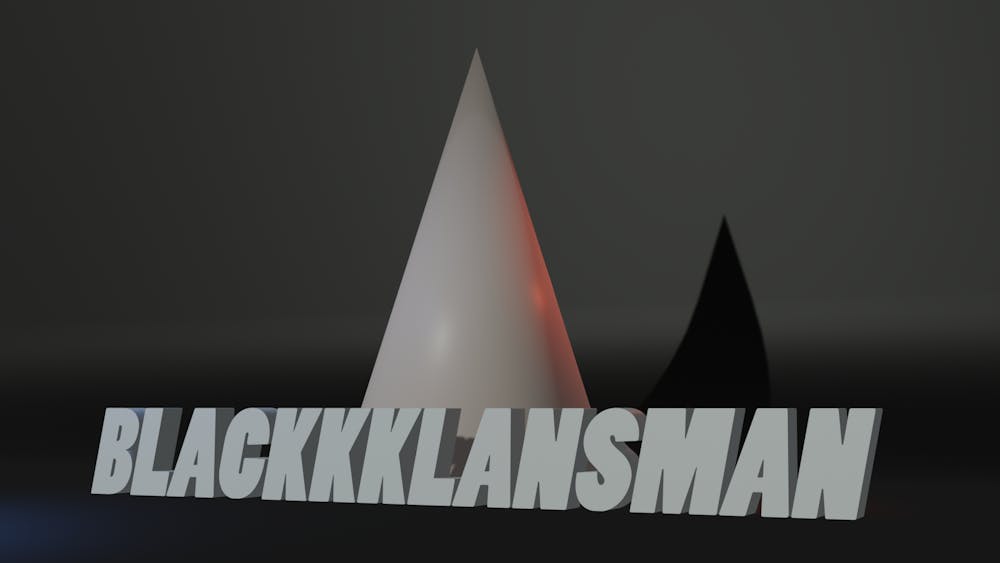When Spike Lee’s “BlacKkKlansman” debuted at the 2018 Cannes Film Festival, it received a six-minute standing ovation; some critics called it Lee’s best film in years. Throughout his career as a director, Lee has used cinema as a medium to explore themes such as race relations and the African American experience. “BlacKkKlansman” updates these themes for modern mainstream audiences, representing a natural progression from his previous works. Thanks to Lee’s masterful directing, a bold screenplay, and an all-star cast, the film combines absurdity, dark humor, and horror into a nuanced commentary on social issues still relevant today.
Set in the 1970s, “BlacKkKlansman” follows the narrative of Ron Stallworth (played by John David Washington) — the first Black police officer in the all-white Colorado Springs Police Department — as he leads an undercover mission to infiltrate the Ku Klux Klan (KKK). A seemingly ridiculous premise? Absolutely. And yet the film is based on a true story: a memoir written by the real-life Stallworth himself.
The film’s plot is set in motion when Stallworth responds to a newspaper advertisement for a local chapter of the KKK, posing as a zealous white supremacist over the telephone. After multiple phone calls with the chapter president, Walter Breachway (played by Ryan Eggold), he starts to gain Breachway’s trust. However, an obvious problem emerges after Stallworth is invited to attend in-person Klan meetings.
As a result, Stallworth teams up with fellow officer Philip “Flip” Zimmerman (played by Adam Driver), dubbing the duo the “Stallworth Brothers.” Zimmerman pretends to be Stallworth at Klan gatherings, allowing the real Stallworth to continue fooling the Klan over the phone.
While Zimmerman monitors suspicious Klan activities, Stallworth infiltrates their upper ranks by building a relationship with the Klan’s national director, David Duke (played by Topher Grace), otherwise known as the “Grand Wizard.” Duke spews extremist and openly racist rhetoric, constantly blessing “a White America,” advocating for “America first,” and praising “The Birth of a Nation,” the 1915 film that glorified the KKK and sympathized with the Southern Confederacy’s Lost Cause movement.
As Stallworth and Zimmerman continue to gather classified information on the KKK, they become caught in an elaborate game of cat and mouse with the Klan. Stallworth's comedic and ironic phone calls with Duke are starkly contrasted with the tense Klan meetings that Zimmerman attends while in disguise. These tonal shifts might seem jarring if executed by a less experienced team behind the camera; but here, they enhance the story by carefully reminding the audience of the suspense and fear shared by minority groups oppressed by a segregated society.
A review of “BlacKkKlansman” would be incomplete without commending some of its stellar performances, namely by Washington and Driver. Washington, the son of cinematic titan Denzel Washington (who starred in Lee’s 1992 film, “Malcolm X”), gives a stunning breakout performance. Washington brings a new energy to the screen and oozes charisma, nailing the comedic and emotional beats. The film also gives Driver the opportunity to show his range as an actor. Driver seamlessly transitions from playing a well-meaning police officer to a raging white nationalist with unnerving realism.
Together, Washington and Driver portray two unlikely characters with surprising similarities. Zimmerman, a Jewish man who has “passed” as a white Anglo-Saxon for the majority of his life, is forced to reevaluate his cultural identity after witnessing the KKK’s racist and anti-Semitic dialogue first-hand. Likewise, Stallworth faces internal conflict related to his racial identity as a Black American. Sparked by his meeting with Patrice Dumas (played by Laura Harrier), a dedicated Black student activist, Stallworth is torn between his place within the Black community and his duty as a police officer who wants to create change within a segregated system. In a rather nuanced manner, the film leaves these questions open-ended, trusting the audience to draw conclusions for themselves.

Today, viewers of “BlacKkKlansman” are able to watch the movie with the gift of hindsight. Nevertheless, the political atmosphere and racial themes portrayed in the film feel eerily relevant in 2020, a year marked by the resurgence of the Black Lives Matter movement and demands for police reform following the horrific murders of Ahmaud Arbery, George Floyd, Breonna Taylor, Philando Castile, and countless other Black Americans at the hands of corrupt police officers.
One scene from the movie in particular feels straight out of a 2020 news headline. While driving home from a peaceful rally, Dumas and three other Black student protestors are wrongfully targeted and violently mistreated by white police officers. Thankfully, the students return safely with little harm. Tragically, many Black Americans who come into contact with police officers are not as fortunate as Dumas and her companions.
Though classified as a historical comedy-drama, “BlacKkKlansman” is very much a contemporary piece of cinema that shines a light on the racial issues that have divided American society for decades and continue to this day. The film’s conclusion juxtaposes menacing imagery of the KKK burning crosses in the 1970s with footage from the violent white supremacist rallies in Charlottesville from 2017, leaving the viewer with a heavy and haunting message. The segregation of the ’70s is not so far away as some would like to think. Ron Stallworth and David Duke are only 67 and 70 years old, respectively. In fact, Duke supports President Trump, who recently failed to condemn white supremacy on national television. The parallels between then and now speak for themselves.
“BlacKkKlansman” is a powerful wake-up call that reveals a side of American history too often sanitized by textbooks and the media alike. This is a movie meant to be seen, with its lessons meant to be heard. As one of the most relevant films in recent years, “BlacKkKlansman” challenges its viewers to reconcile the complex legacy of our nation and confront fundamental truths about ourselves.

The USG Movies program, sponsored by Undergraduate Student Government, typically brings films to the Princeton Garden Theatre for free student viewing. The program has adapted to the virtual semester by unlocking a new movie and discussion topic each Thursday via a Canvas site and by hosting a discussion of the week’s movie each Saturday at 9 p.m. ET. All films can be streamed for free by University students.








